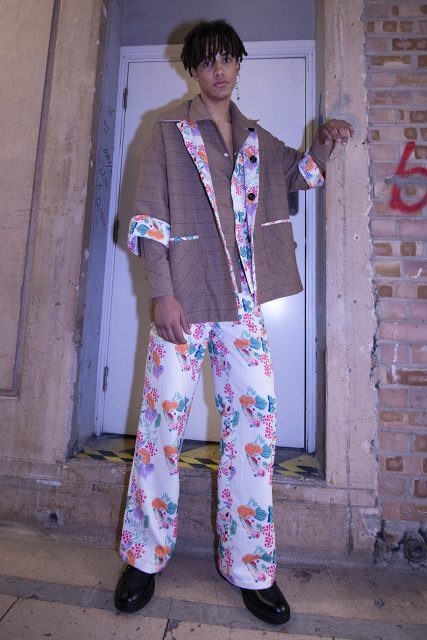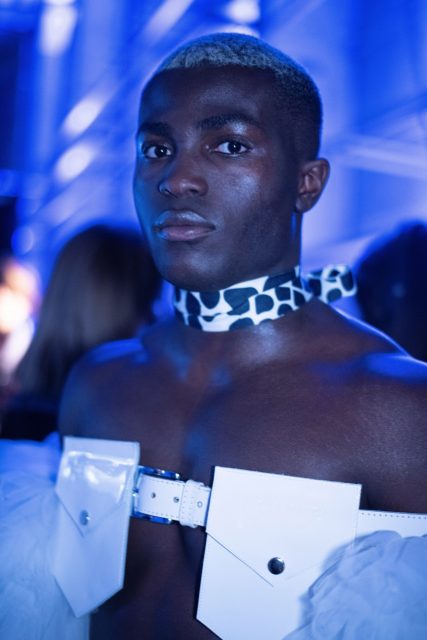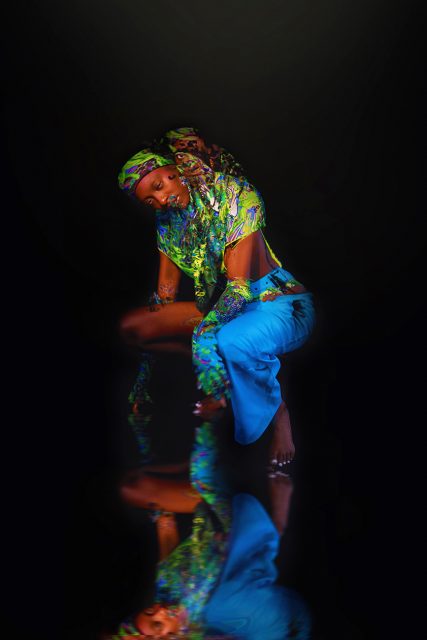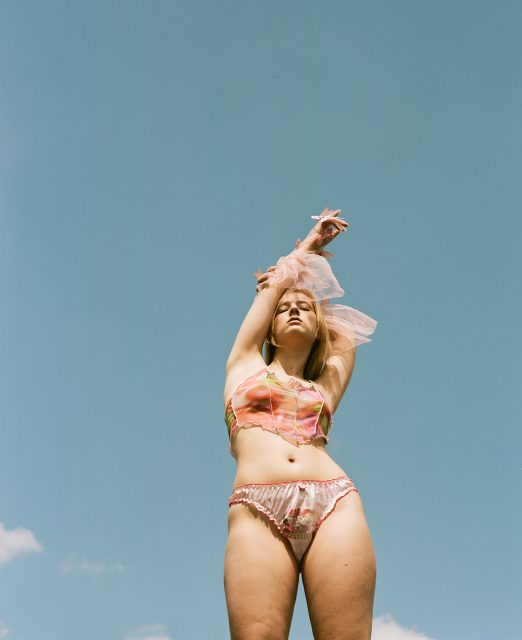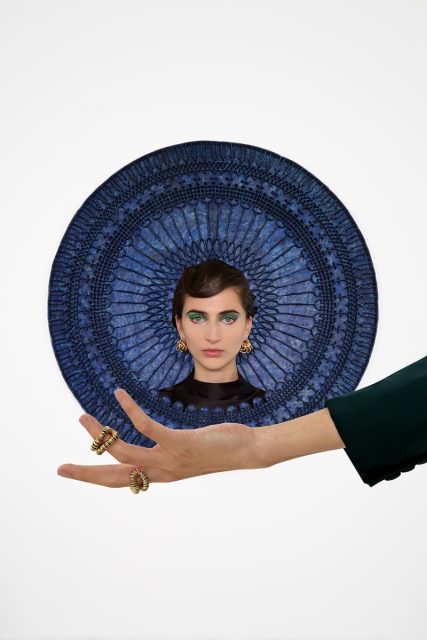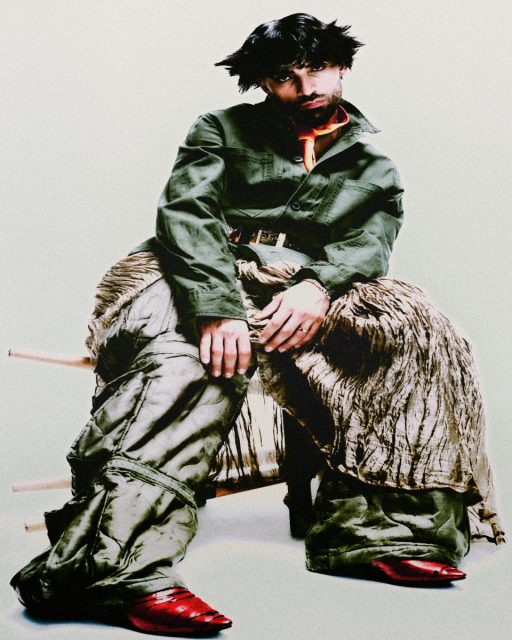Last month the cultural hub of London hosted its AW20 Fashion Week. As part of the ‘Big Four’, London always will be a magnet for revolutionary clothing. Over the past few years, we have monitored a shift as designers attempt to use their collections to do more than just turn heads. Sustainability was undoubtedly the hot topic for this year’s Fashion Week. However, Œ noticed three labels who took things one step further.
Refuse Club, Christoph Ritter Studio and DB Berdan, all made an evident point of highlighting that they wanted much more than applause. They want Change. Although all three brands are advocates of Sustainability, they also had their own socio-political statements that they wanted to send out with their latest collections. After watching their shows at Fashion Week, Πdecided to interview the labels to find out more about their collections and how they believe they can positively impact the future of fashion.
Refuse Club
Originally from China, Refuse Club make designs with the purpose of addressing current feminist/youth/subcultural movements, with a strong focus on Chinese identity. As individuals, they care a lot about the global socio-political environment and claim that this drives their work. Initially, the brand agenda was merely to deconstruct propaganda imagery through prints, textile design and other forms of fabric manipulation. However, two seasons later, they are now reflecting and doubting how deeply politics can really be talked about within the realm of fashion. As Refuse Club told Œ: “Right now, there are thousands of start-ups on Instagram trying to “sell feminism” or “sell subculture”, we don’t want to be seen as another fashion brand merchandising ideology”.
|
|
Œ: What cultural conversations were you hoping would surface after your catwalk show?
Refuse Club: It took us the past year to figure out how to bring actual conversational changes to the industry. The two of us are from Chongqing, a southwestern Chinese megacity, where the clothing industry has been dying down (similar situation as Montreal). Made-in-China doesn’t guarantee low cost any more. The local manufacturers possess great skills but lack of advantage in pricing. Urgently they need to shift from “made-in-china” to “designed-in-china”. Refuse Club has a strong personal relationship with a lot of family-owned local sample rooms and tailoring ateliers, therefore has the capacity to provide customization service for our customers. Along with the AW20 collection, we were also working on building a customization system, which allows clothes to be individually fitted if the customers are willing to provide us with their measurement and wait for 5-7 extra days. We also will be offering alternative magnet closures for those who have physical difficulties buttoning their clothes. We have web designers working on it and plan to launch the service on our site later this spring.
Œ: Refuse Club promises ‘uncompromising aesthetics’. What does that entail?
Refuse Club: “Uncompromising” means that we will never consider lowering the quality of the material to hold a shape, or sacrificing the silhouette for the touch of fabric. If we fail to source correct material for a specific design, we drop the style”.
Œ: How does your latest collection take on the theme of Identity and why is this a principal concept for Refuse Club?
Refuse Club: Coming from China, we are mainly disturbed by how the giant censorship machine swallows identities and invades private space, like the human body. Ever since the 2016 election, we have sensed that a certain group of population’s thoughts are going backwards. In China, it’s the same if not worse. There’s less open-mindedness but more constrictions, placed upon every aspect of life, including fashion styles. For example, tattoos and piercings (including earlobe piercing on male) have been banned from appearing on national television. As the 70s punks say “style in revolt”, when everything goes backwards, at least we could push our styles upfront.
Œ: How can the political issues concerning China be tackled through Fashion? In particular by Refuse Club?
Refuse Club: As I explained in the first question. We are also becoming sceptical of if fashion, as a form of art but more on the commercial side of the spectrum, has the ability to advocate social changes. And as the censorship becomes more and more intense these days, we feel guilty that for not being able to talk about “the elephant in the room”. After all, we all know what is strangling our throat and making us speechless. As complementary, we want to shift our main focus to catering customized ready-to-wear to our customer and help revive local independent fashion suppliers.
Œ: How are political and social issues regarding Femininity/Feminism approached by Refuse Club? Especially with this latest collection?
Refuse Club: For AW20, style-wise, we took a lot of inspiration from 90s grunge “Kinderwhore” look. We thought it as a hidden gem that hasn’t been reinterpreted much by Asian designers. In the Chinese entertainment industry, you find a carbon copy of every stereotypical Hollywood star but not the rebellious kind. There’s no consumer market for “bad girl” or even a “bad boy” in the mainland. Culturally, many of us are conditioned to depreciate anything with the slightest hint of deviance.
As for fabrication, we also made digital prints illustrating a collage of metaphoric items that relate to our theme. For example, in the picture below we have drawn a group of everyday items deemed as auspicious in a woman’s life. For instance, the peaches symbolize young girls with juicy facial skin, the grape contains a wish for fertility, the bonsai signifies longevity. We arrange these objects with a pair of legs leaning on top wearing Mary Janes, and we sliced the peach in the picture. It’s our way of saying “we don’t really give a damn about your wishes”.
Christoph Ritter Studio
Born and raised in Vienna, Christoph Ritter settled in London in 2018. As a response to his dismay with how individuals are commonly overworked and underrepresented within the fashion industry, he decided to construct Christoph Ritter Studio (CRS). CRS is a team of individuals, who aim to tackle two key problems in the fashion world: Sustainability and Transparency. The promise of CRS is to be as ‘socially responsible’ as it is ‘ecologically responsible’. In doing so they have created a completely sustainable collection, which makes sure everyone involved is represented.
This February for London Fashion Week they released their first collection: 2120. However, to make a point of how ‘transparent’ they want to be, instead of exhibiting the collection with a catwalk, they opted for an intimate live shooting and presentation. As this is a clubwear collection, the exclusive Mayfair cocktail lounge Sketch hosted an evening for CRS, where the staff wore the collection. By allowing the staff to wear the collection instead of models, we can see how CRS is breaking down the barriers between clothes, designers, and consumers. CRS is re-writing the rules.
Œ: What initially drew you to create such conceptual clothing?
Christoph: I believe the main reason, why I am attracted to these topics is that my value system diametrically opposes what the majority of the fashion industry stands for. I am anti-consumerist, I hate social hierarchies and I don’t believe that these old established brands should impact how younger generations express themselves. The way I see it, fashion has this amazing ability to influence people’s self-perception and expression. However, what is idealised is often detrimental to people’s well being and our planet. Consumerism is put first and even designer clothes become empty shells that don’t engage with the person who wears them. I believe my focus on concepts allows me to feel confident about my work. My intellectual engagement with people, issues and the world is something you can debate but not dismiss. I like to create pieces that have something to say and don’t need someone else to give them meaning.
Œ: The ladder is the logo of CRS, which represents your commitment to 100% transparency. Can you elaborate more on this idea and its origins?
Christoph: The original idea came from the expression of climbing the social ladder, which is something that the club world heavily revolves around. As a religious symbol, it represents the connection between heaven and earth. I am an atheist but heavily driven by ideals, so for me, it symbolises the search and path to perfection. I believe this path is what matters, not the place that you reach at the end of it.
Œ: For London Fashion Week, instead of opting for a classic catwalk show you hosted two intimate events to present your collection. Is your commitment to transparency the reason why you chose to present your collection in this way?
Christoph: Definitely. We are trying to question what fashion in the next 100 years should look like. I want people to really get a relationship with each piece they own. I don’t believe that this current method of having models walk past a few selected people and having a majority of people look on it on their phones will encourage a sustainable engagement with the garments. I loved the idea of having all the people who were involved in this collection contributing to the energy of these two events so that people outside could get a 360-degree experience of what we are all about.
Œ: The call to tackle environmental issues via fashion is on the lips of almost every young designer. What differentiates CRS from other sustainable designers at the moment?
Christoph: It’s great that more and more young designers are commenting and contributing to environmental causes with their work. I believe every one of them deserves recognition for changing the system. I believe what makes our approach unique is that we target a customer group, which is often ignored by sustainable fashion designers, namely club girls. The two worlds are still so opposed that they are never exposed to each other. I believe that by designing specifically for their needs and desires I can become the link to connect them with progressive values and ideals.
A lot of labels greenwash by practising one or two methods of sustainable design like using organic fibres or not producing in anonymous sweatshops. We are committing to act responsibly in every decision we make. All our pieces are either made from recycled ingredients. We source the threads from eBay, our printed fabrics are made from recycled plastic bottles and all our pieces are 100% transparent. Every person involved with the pieces is credited and the entire history can be traced from conception until production.
Œ: Every collection of yours is very different in style. What were your influences to create a glamorous club wear collection this time around?
Christoph: Like with most creatives, their work represents certain moments of their lives. I am finally out of the constraints of education and the life I am creating for myself involves amazing bonds and friendships with these great women I go out with. Every one of them is passionate about improving the lives of others in different ways and the energy that they put into their charities and projects is so beautifully reflected in the way they party. The reason I am focusing on clubs is that it emulates this little piece of paradise, where you can enjoy yourself, meet people you would otherwise not cross paths with, and express yourself in whatever way you see fit.
Œ: Each garment has been cleverly designed to be worn in multiple ways. Can you explain your thought process behind this?
Christoph: For me, sustainability does not end with your choice of materials or how you handle your waste. People have less and less storage space and are bullied into wearing new things all the time. I think it is our responsibility as designers to use our intellect and skills to offer people clothes that live with them, and that have personality. I want you to interact with what you wear so you appreciate it and realise that it is part of you and not disposable.
Œ: The 2120 collection is made with the ‘woman of the future’ in mind. What does the ‘woman of the future’ mean for you?
Christoph: For me, the ‘woman of the future’ is a break with the search of ultimate beauty that is currently propagated. For centuries you had artists, scientist and philosophers try to find a recipe for absolute beauty. In reality, this just meant the search for the most generic, least challenging character traits which kills any cultural progress. We are now witnessing a cultural shift towards accepting new kinds of beauties, which I see as a huge blessing. For me, the ‘woman of the future’ is striving for individual self-expression instead of the blind following of universal acceptance.
DB Berdan
The young and matriarchal team that makes up London-based brand DB Berdan includes Turkish designers Beg Berdan and Deniz Berdan. As a self-proclaimed Queer label, through their clothing, they hope to tell their stories of oppression and give voices to those struggling with civil rights issues in their homeland. Assuring genderless clothing, their brand operates as a protest against Heteronormavity. “Proud advocators of the LGBTQ community, when Pride was banned from the streets of Istanbul, they brought the celebration to their Catwalk for Mercedes Benz in protest”.
For this Fashion Week, DB Derdan presented their latest collection Scan to Escape. This particular collection merges reality with the digital world.
Œ: Do you feel that your national identity has had a defining impact on your creative process? If so in what ways?
DB Berdan: Yes, we do feel a huge impact from our cultural identity onto our creative process. Turkey has deep matriarchy roots that although forgotten by many are not lost in the practice. As three generations of women working in textiles, DB Berdan really portrays our roots in this sort of sense.
Œ: What first captured your interest in creating conceptual clothing?
DB Berdan: Social rights has always had a priority in our lives relating to our geography. Our struggles and our fight towards social issues reflects our lives and through that, our clothes and collections. So in a way, our clothes are a reflection towards our inner struggles and acceptances.
Œ: This collection boasts ‘Gender Fluidity’ – What does that mean to DB Berdan?
DB Berdan: DB Berdan has always been a true supporter of acknowledging all genders and aims to have a high range of the ends of the spectrum from high feminine to masculine. From the very beginning, we really tried our best to empower all genders and encouraging their visibility in the textile industry.
Œ: As LGBTQ+ advocators, how do you believe Fashion can be used to transform the way people think of and treat the LGBTQ+ community?
DB Berdan: While fashion, as a mainstream tool can definitely boost the visibility of the LGBTQ+ community, it can also turn it into an all-consuming and shallowed out image, that can really hurt the whole meaning and the struggles of the community. What fashion needs to aim is to empower its own community that they identify with and not do it forcefully to exploit.
Œ: You both have illuminated the urgent need to combat the Climate Crisis. What methods have you taken with this collection to ensure you are helping dilute/prevent the effects of it?
DB Berdan: We have prioritised our material research in ‘eco-conscious materials’ by focusing on sourcing environmental fabrics and accessories. Using ethically sourced denim from Orta. Orta has anti-bacterial, biodegradable hemp fabric, consumer recycled denim, and eco coated natural clay died denim.
We love using different textures and qualities of fabrics so we also had silky natural Lenzing Fibre Satins and some multi-stretch activewear fabrics to top things off. Not just with fabrics, but with all the accessories that were used in the collection, they are environmentally conscious. The zips are made from blue plastic caps from water bottles. Snaps are made with reduced water usage. The ropes are made from recycled polyester.
All photos by Peter E. Reiche.


